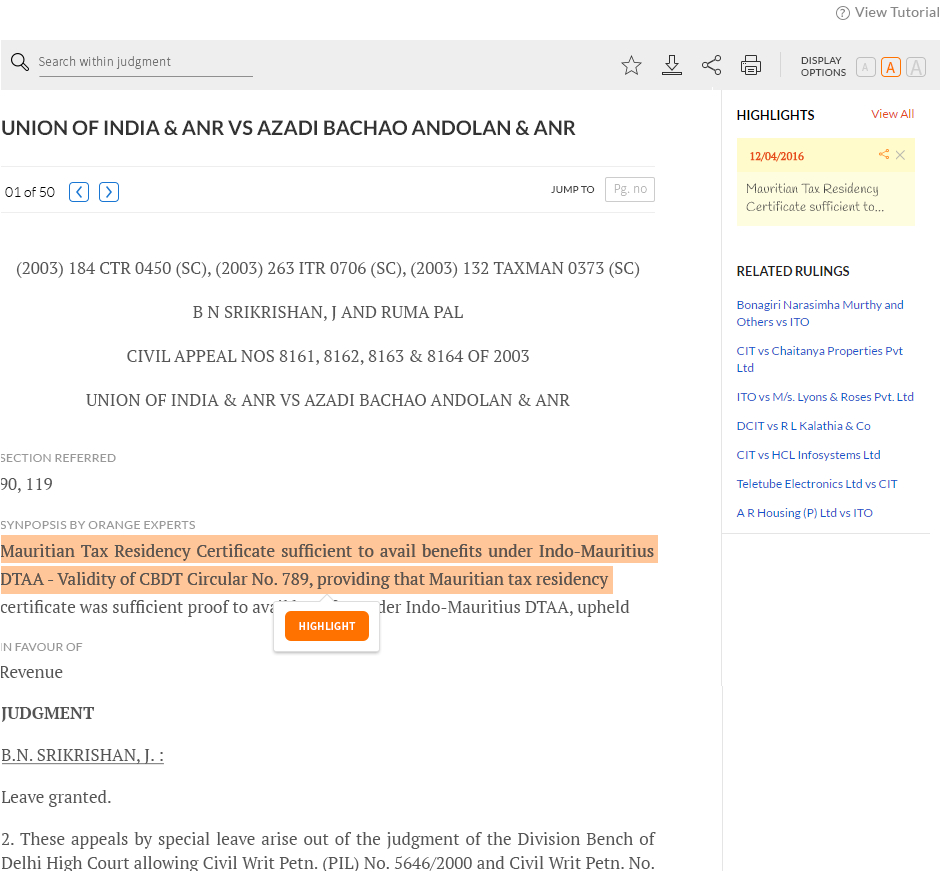
-
2016-08-31
Article 3(2) of the OECD Model Convention reads: ‘‘As regards the application of the Convention at any time by a contracting state, any term not defined therein shall, unless the context otherwise requires, have the meaning that it has at that time under the law of that state for the purposes of the taxes to which the Convention applies, any meaning under the applicable tax laws of that State prevailing over a meaning given to the term under other laws of that State.’’
The application of Article 3(2) in India is still evolving and hence, there is limited jurisprudence on this matter. In the case of Leonhardt Andra Und Partner [TS-5187-ITAT-1987(Calcutta)-O], the issue before Income Tax Appellate Tribunal, Kolkata was whether the definition of 'royalty' given in explanation to Section 9(1)(vi) can be taken into consideration in applying Article III of the Agreement by virtue of Article II(2)[1] which provides that any term not defined in the Agreement would have the meaning which it has under the tax law in the Contracting State. The Tribunal replied in affirmative. Further, in the case of Foramer S.A. [TS-5326-ITAT-1994(Delhi)-O], the Income Tax Appellate Tribunal, Delhi interpreted the term ‘written down value’ by invoking Article II (2) and held there is no scope but to refer to the Indian Income Tax Act, 1961 for adopting written down value and rates at which depreciation should be allowed.
Lately Article 3(2) gained importance in the tax world as countries unilaterally define terms in their domestic laws and use the same to justify the taxation. An example of this is in the amendments made vide Finance Act, 2012 retroactively[2] whereby inter-alia Explanation 6 was inserted under section 9(1)(vi) of the Income Tax Act, 1961 which states, “For the removal of doubts, it is hereby clarified that the expression ‘process’ includes and shall be deemed to have always included transmission by satellite (including up-linking, amplification, conversion for down-linking of any signal), cable, optic fibre or by any other similar technology, whether or not such process is secret.”
A perusal of the decisions discussed above shows that Article 3 (2) has been used so far only to interpret the set and not the subset; as in ‘royalty’ and not any term used within the definition of royalty. Scope of the present article is limited to address whether a meaning of the term ‘process’ can be imported by virtue of Article 3 (2) within the definition of royalty or not. This issue was addressed by the Hon’ble Delhi High Court in a recent case of Shin Satellite Public Co. Ltd [TS-5188-HC-2016(DELHI)-O].
In this case, the Court was seized with a question as to whether the income derived by taxpayers through data transmission services was taxable as royalty under Section 9(1)(vi) of the Act (amended definition) as well as Article 12 of the tax treaties. The Court held that the payment for data transmission services through a transponder is not royalty under the India-Netherland Tax Treaty/India-Thailand Tax Treaty and a retrospective amendment introduced by the Finance Act, 2012 to the definition of ‘royalty’ will not affect Article 12 of the tax treaties. The author is of the view that through Finance Act, 2012[3] the legislature has per se defined a term already used in the definition of royalty and has not amended the definition of royalty to expand its scope.
Delhi High Court has also made a reference to Article 3(2) of India-Netherland Tax Treaty/India-Thailand Tax Treaty, though, declined to use 3(2) citing the reason that the situation before the Court was materially different and there was in fact a definition of the word royalty under Article 12 of both treaties, thus dispensing with the need of recourse to Article 3(2).
The author, with due respect, begs to differ with the reasoning for the following reasons:
- Article 3 (2) provides for usage of domestic law for meaning of any ‘undefined term’ in treaty. A perusal of India-Netherland Tax Treaty/India-Thailand Tax Treaty shows that the term ‘process’ is not defined in the said treaty and thus, resort can be taken to the domestic law.
- Article 3(2) provides for the usage of domestic law meaning only where the context requires soe. before applying the domestic law meaning for an undefined term, it is necessary to check whether such meaning is consistent with the context in which the term is used in the tax treaty. In this regard, the context is same in the present case as the term ‘process’ is used in the definition of royalty, both in Indian Income Tax Act, as well as treaty.
Learned author Dr. Professor Klaus Vogel has also expressed the view that words used within the definition of royalty but not defined in treaty can be interpreted by resorting to Article 3 (2) in the following words:
“Article 12(2) contains a special treaty definition of the ‘royalties’. This precludes any interpretation of the term by reference to domestic law. Not excluded, however, is the use of domestic law to interpret terms used by Art. 12 (2) to define royalty.”
Another learned author Luc De Broe has also expressed the view that the undefined parts of definitions provided in the treaty (an example are the many undefined terms used in the definition of Royalty in Article 12(2) of OECD MC) will get classified under the word ‘term’ used in Article 3(2).
Article 3(2) can thus, be invoked in the context of royalty in treaties to interpret ‘process’ in light of Explanation 6 to Section 9(1)(vi) where such word is not defined in treaties.
[1] In the application of the provisions of this Agreement in one of the territories any term not otherwise defined in this Agreement shall, unless the context otherwise requires, have the meaning which it has under the laws in force in that territory relating to the taxes which are the subject of this Agreement.
[2] With effect from 1st June, 1976.
[3] Explanation 6 to section 9(1)(vi).

